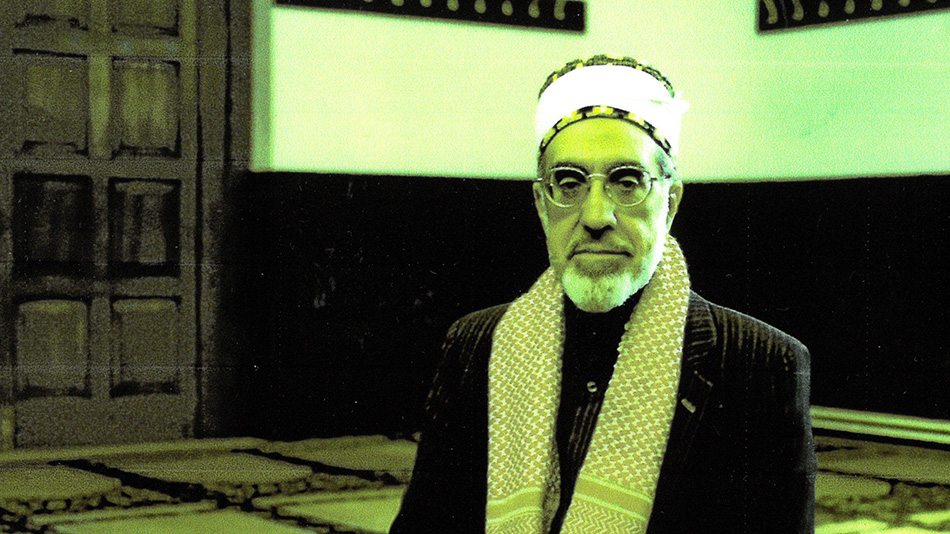Eleven years after the death of one of Wales’s most prominent religious leaders, many in the community feel he is just as irreplaceable now as ever. How has the Islamic community changed since his death, and does it still need a single leadership figure?
Thousands of people amassed on Butetown, from across the UK, all of them focussed on one destination, a pilgrimage to one of Wales’s oldest Mosques. Those who couldn’t find space in the mosque gathered quietly and solemnly outside, circled around its bronze dome. Though the South Wales Islamic Centre (SWIC) had always been a gathering place, rarely had it hosted such a large crowd, and even rarer did the crowd gather to pay their respect to just one man.
Sheikh Sai’d Hassan Ismail had served the Butetown community for decades as the Imam of the South Wales Islamic Centre, a Yemeni mosque renowned throughout the Welsh Muslim community. His death at 81 in 2011 brought swathes of people to his funeral, from community leaders to politicians, causing the police to block off Bute Street to accommodate the number of mourners. To this day Sheikh Said’s name brings a drop in tone of voice, an abrupt pause in thought or a respectful nod of the head across the Cardiff Muslim community.
“I saw him with community events, community prayers, community funeral… anything to do with the community, he was right at the forefront,” says Ali Ahmed, a Cardiff councillor for Cathays and City Centre and previously for Butetown. Ali looked up to the Sheikh as a mentor and father figure in the 25 or so years he knew him. “He was trying to establish the good way of life for the Muslim community and the wider community as well. That is the reason everyone followed him,” he says.
The Sheikh’s influence was ever-present within the Islamic community in South Wales, his time in Cardiff saw the city change and grow. Since his death these changes have not stopped, not least within the community itself.
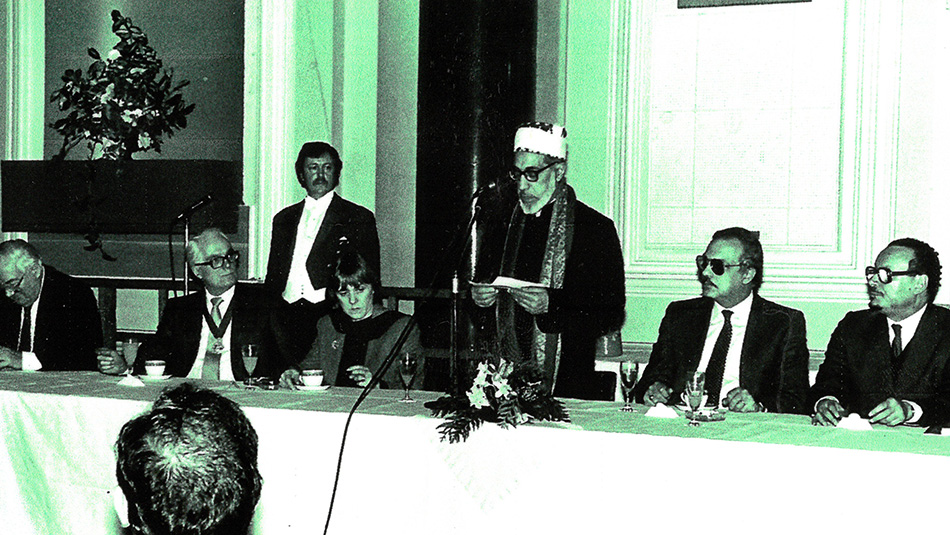
“I think our community is a little bit different than it was, we’ve gotten a lot of graduates, doctors, solicitors, barristers, when eleven, twelve years ago, (there) wasn’t, so they all got their different way of life,” says Ali.
Ali sees these new professionals as a source of new and various forms of leadership for the community. Yet Ali, like many in the community, see this new leadership form as far away from bridging the personal community touches the Sheikh brought.
Preceding the Sheikh’s devoted following and life as a religious leader, his upbringing was heavily influenced by both British and Yemeni identities.
Born in South Shields to a Welsh mother and a Yemeni father who, like many who had migrated to the UK, was a stoker on a British merchant navy vessel. However, near the start of the second world war, his ship was sunk in the Bristol Channel by a German aircraft, which made him one of the 800 Yemeni men from South Shields to be killed at sea during the war.
Shortly after, at the initial reluctance of his mother, young Said was adopted by the prominent Yemeni cleric Sheikh Hassan Ismail who took him to Cardiff. This move, plus a few years in Yemen, engaged in the language, culture and religious teachings, would begin his life-long relationship with Cardiff and Butetown.
Dr Abdul Azim Ahmed, a Pakistani-Bangladeshi Welsh Muslim and academic, is the deputy director of the Centre for the Study of Islam in the UK based in Cardiff University and the secretary general for the Muslim Council of Wales (MCW). Azim believes Sheikh Said’s longstanding connection with Cardiff was instrumental in his relationship with the community.
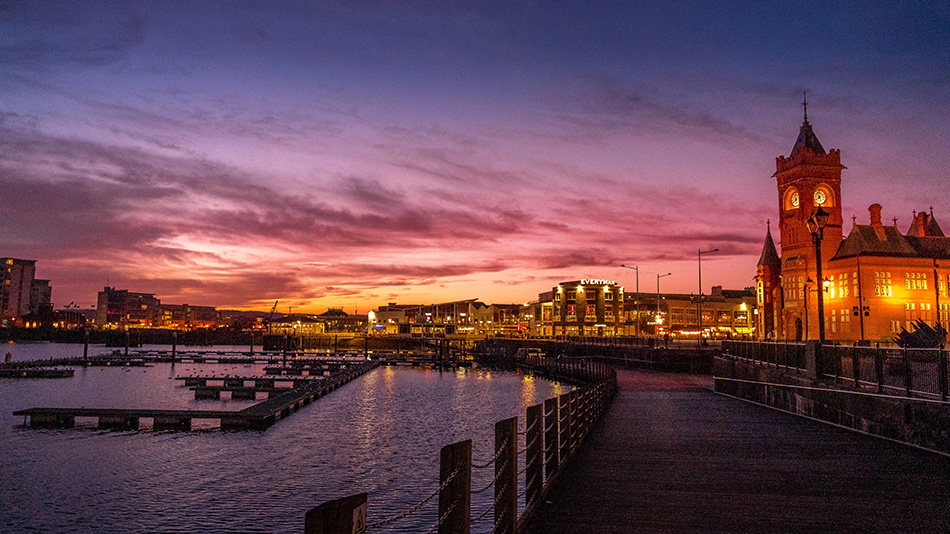
“He was one of the longest serving Imams we have on record in the UK… And that meant everyone knew him, it meant everyone had a degree of respect for him. He had seniority both in relation to his age and his studies and knowledge, but also for his length of service,” Azim says.
Azim feels this has created a legacy that is hard to replicate. “All that together meant he was able to be a kind of linchpin figure in a local Muslim community, and one that hasn’t easily been replicated and probably can’t be, not for a long time,” he says.
His influence spread beyond Butetown. He was associates with then-home secretary, later prime minister, James Callaghan as well as Wales’s First Minister Rhoddri Morgan, who attended his funeral and said of the Sheikh: ‘His wise counsel at times of crisis has made him a truly significant figure in the shaping of modern Wales.’
Daoud Salaman, a Welsh-Yemeni who grew up in Butetown, was the previous chairman of the South Wales Islamic Centre. He co-founded the mosque alongside Sheikh Said where they worked closely together in its operation. In his thick Cardiff accent Daoud recalls Sheikh Said’s relationship with the, then, Welsh first minister, Rhoddri Morgan.
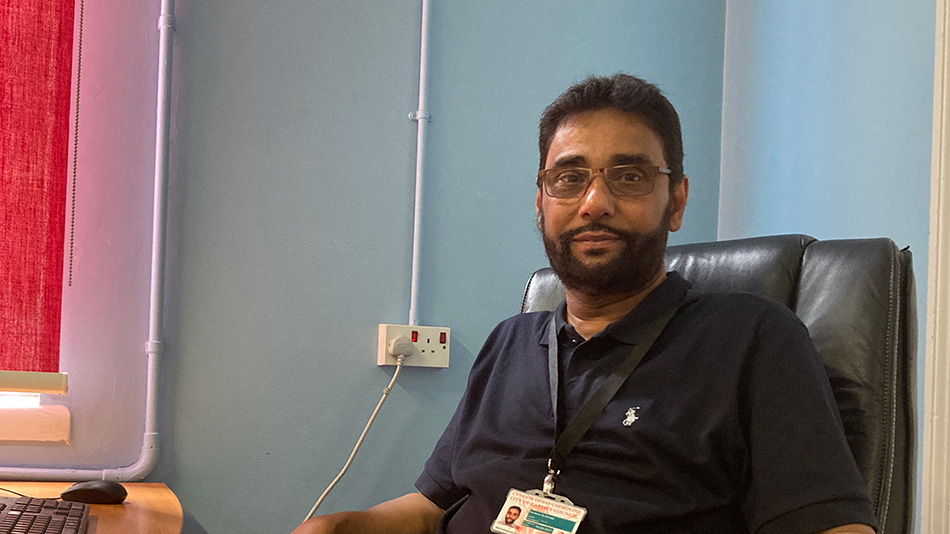
“Whenever they had any problems with Islam, or things to do with Islam, he’d (Rhoddri Morgan) always send one of his people across to see Sheikh Said and ask him what his views were on different matters,” he says. “They didn’t always agree with one another, but if ever he needed Sheikh Said’s help with interpreting something or explaining something, Sheikh Said would always give him his opinion.”
Throughout his career, the Sheikh’s skills at negotiating the world of local government were admired by the community, many have attributed his diplomatic efforts as a pathfinder for other Welsh institutions.
Azim believes his abilities have had a lasting impact. “One of the things that he was able to do was act as a bridge between different groups, he was able to engage very successfully with government and local authorities,” he says. “His importance was that he was doing that in the 80s and 90s, and quite early on, but I think because of the legacy Sheikh Said has left behind, others have been able to pick up on that political side of engagement.”
The MCW is an institution aimed at connecting areas of Muslim civil society, such as charities and religious institutions. it branched from the Muslim Council of Britain in 2003. Azim says it is a relatively new institution compared to other Welsh and British religious groups. He sees its conception as partly thanks to the work of the Sheikh.
“I think much of the work he did prior in Cardiff is what made the Muslim Council of Wales possible in the first place, he’s able to create these bridges, these networks, these associations,” says Azim.
Many say his ability to build relations and ease tensions were not just subject to the world of local politics and authority. Ask members of his congregation and they will tell you his biggest Impact was arguably his hands-on community work including personal and family issues, where it appears he is most sorely missed.
Said Muhammed, a member of the Cardiff Muslim community of Egyptian heritage, grew up with the Sheikh ever-present in the community. Sitting confidently and comfortably on a park bench in his childhood neighbourhood of Butetown, as if it were his own garden, Said says, “if you had a problem, you would go to him, you know, anything, no matter what it was, (if) It was big or small, matrimony, family divisions, money problems.”
“If there was a dispute between families… he would do his best to sort that out and nine times out of ten, he would,” says Said.
Family issues such as divorce, while discouraged, are not prohibited in Islam. Councillor Ali Ahmed believes that in Cardiff, Islamic divorce has become more prevalent in the wake of Sheikh Said’s death.
“It’s happening left, right and centre. When he was around, he used to sit down with both sides, both husband and wife with their family,” says Ali. “He mediated many of those, he solved many of those problems. Now there’s no figurehead to do that.”
Azim also views these mediation skills in leadership, which the Sheikh was renowned for, as a massively advantageous community asset.
“You have tensions, you have friction points, that’s just an unavoidable part of being part of the community… that’s where figures like Sheikh Said come in to go full circle… they have a unique capacity to resolve those conflicts,” says Azim.
The Sheikh’s abilities in solving disputes and issues ranged from the interpersonal to calming sectarianism as well as displaying a no-nonsense attitude towards extremism. However, since his death the divisions within the Yemeni community seem to have widened.
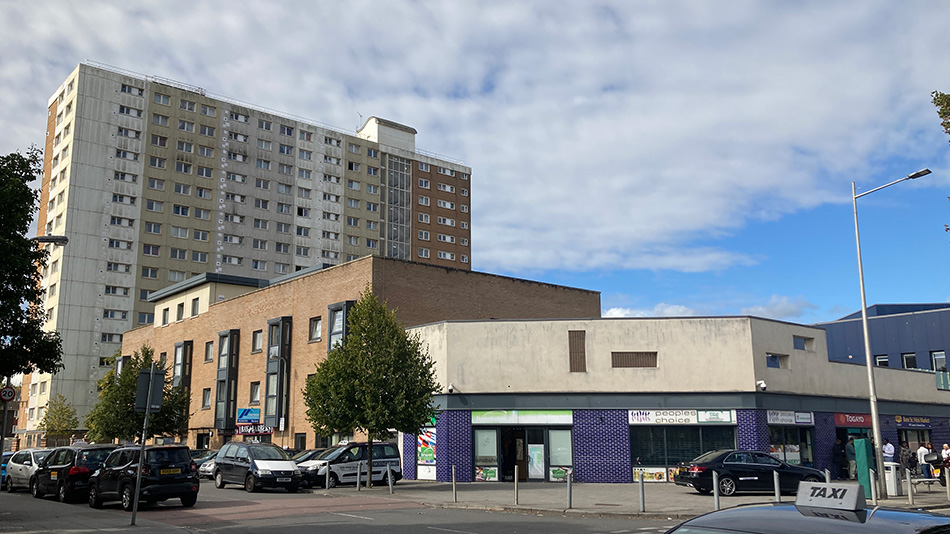
Previously playing a leadership in the SWIC alongside the Sheikh, Daoud feels that the Yemeni community is lacking in any trustworthy leadership potential and that the community is now fractured. “It’s just the Yemenis are not one. they’re divided, they’re different people.”
Despite the difficulties in trying to replace such a key leadership figure, it is worth noting that the ground around the Sheikh’s old neighbourhoods also seems to be changing, creating challenges to previous ideas of community.
As Britain’s oldest Islamic community, Yemenis have made Butetown a strong part of their history.
Historically the area always been a diverse mix of immigrant communities such as dockworkers and Yemeni and Somali seamen, earning it the name Tiger Bay. However, as Britain’s place on the industrial world stage died in the latter half of the 20th century, so too did the upkeep of the docks, leaving them decrepit and derelict. In 1994 a £220m project was started to rejuvenate the docklands, with mermaid Quay being a hub of retail and restaurants overlooking the bay.
Despite Butetown’s residential area sitting between the bustling city centre and the revitalised historic bay, some have criticised the fact that it is still yet to capitalise from the financial benefits of the city and the gentrification of the bay.
Azim believes the loss of the Sheikh only makes these issues more pungent, “Sheikh Said was one of those figures who bound together the community in Butetown, and you’ve got to also recognise that there’s a lot of challenges that are impinging on the community’s capacity to carry on as they used to do,” he says.
“Development in Cardiff Bay was one which was largely excluded development in Butetown… track how much a burger costs when you’re walking from Bute Street down to Mermaid Quay and at one point it will cost about £3.50…” says Azim. “Then 100 metres down the road to get to something like Gourmet burger kitchen, it’s like, 15-20 quid.”
Said Muhammed also believes that the growth of the bay is causing shifts in the community which may have been out of the Sheikh’s reach.
“When you’re demolishing houses and putting people on council estates on either side to Cardiff, you’ve got very little chance of keeping our community together,” he says. “So, you think about that on the scale of the area… this is on borrowed time… This is going… this area will be gone.”
Said’s outlook on the future of the area’s solidarity is bleak, “There’s no division, because there’s no community.”
However, while the community has undoubtedly felt the loss of such experienced leadership, there has still been growth, thanks in part to the Sheikh himself.
As his long-time kidney issues became more severe, the Sheikh could see the end of his life was near. He began preparing and training members of the community to take over his responsibilities once he was gone.
Ali Ahmed saw this preparation. “He was successful when he was well and healthy, and I believe he trained, or he had people around him witness exactly what he was doing, and they are following his footsteps,” he says.
As the Yemeni and Islamic communities grow, the need for a single leadership figure in terms of civil society becomes less clear. Ali has noted the growth in professionals in the Cardiff Islamic community.
With the acceleration of professionals within the Islamic community has come new ideas and directions for Muslims in Cardiff. Ali sees that there is no longer just one voice making the decisions.
Ali believes this has changed the leadership dynamic in the Muslim community, he says, “there are lots of things that they are doing as well, which is absolutely correct and which I support them as well. But I don’t think we have room for one leader in Cardiff anymore.”
Groups such as the MCW and other groups such as the Newport and Cardiff Yemeni Community Associations as well as the Sheikh’s very own South Wales Islamic Centre, continue to serve community needs, and religious leaders continue to be a source of personal assistance to their congregation.
However, the personal touch of Sheikh Said and his knowledge and experience remain a gap that longs to be filled, and according to those who lived alongside the Sheikh, will not be filled any time soon.
While Ali fully supports those young new leaders and professionals rising through the ranks, he feels that fulfilling the role of the Sheikh is just out of reach:
“Obviously, it’s going to be very difficult to follow his footsteps… but they are trying to fill that gap, but it’s going to be impossible.”
